
How To Dispose Of Cleaning Products & Laundry Supplies
Declutter Cleaning Supplies & Tools {15 Minute Daily Decluttering Mission}
Today's mission is to declutter cleaning supplies and tools. As part of that process you may run across household cleaners you don't want and that can't be donated. Here's how to dispose of cleaning products and laundry supplies.
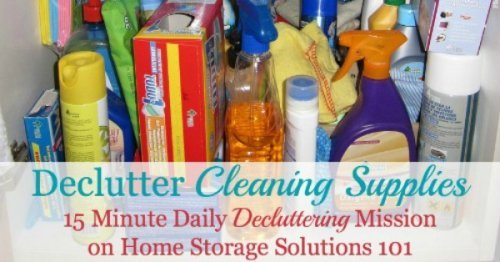
Instructions For This Decluttering Mission
First, let's discuss this decluttering mission though, briefly. It's pretty self-explanatory though.
The mission is designed to be done in conjunction with the Create A House Cleaning Schedule & Organize Cleaning Supplies Challenge, which is part of the 52 Week Organized Home Challenge.
Obviously, don't throw everything out -- you still need to clean, after all. But throw out all the empty bottles, or if they're almost empty (and you'll actually use them) make an effort to use them up before opening or purchasing anything else so you can get rid of those things soon.
It's also time to toss anything you bought but just didn't love and so you never use.
In addition, declutter your cleaning tools, such as mops, brooms, dusters, vacuums, etc. Again, don't declutter them all but if you've got multiples, something is broken, or there are just items you never use it is time to let them go.
You may also want to take this opportunity to declutter your laundry supplies, although that mission comes in a different week. (But you can click the link and read more about that mission if you want to tackle it now as well.)
How To Dispose Of Cleaning Products & Supplies You Don't Want Anymore
Each time I've had this mission I ultimately am asked how to dispose of cleaning products and supplies you decide you don't want as part of the decluttering process. So that's why I did some research for you, to put your concerns to rest so you felt like you could let some of this stuff go.
And just FYI, even though I often talking about cleaning products in the article, it generally applies to laundry supplies as well for when we get to that declutter mission later this year.
The Simplest Way To Dispose Of Cleaning Products Is To Use Them
The simplest way to dispose of cleaning or laundry supplies is by using the product up. Seems simple enough, huh?
Of course, I understand that sometimes a product has been sitting on a shelf for quite a long time. Some products lose effectiveness with time, and so you just will need to get rid of them since they won't actually clean well. (I have a quick discussion of how long some products last below, to help you make this determination.)
Or perhaps you bought something and then were disappointed with it, meaning it never worked well even when new. Again, that, I know, makes it hard to just "use it up."
Don't Forget You Can Donate Cleaning Products
If you've just got too many bottles of window cleaner to forsee using them up in the next two years, for example, and some of the bottles are unopened, don't forget you can donate these items.
There are a lot of organizations that would be appreciative of cleaning supplies, either to use for themselves, or to provide to others.
Some organizations will even accept opened containers, but you need to call and ask because you never want to donate what someone else would consider trash.
Obviously, if the product has lost effectiveness don't donate that either. If it won't work for you it certainly won't work for someone else either.
What To Do With The Supplies You Can't Use Or Donate: Trash Or Flush Down Drain Is The General Rule
For those items that you want to declutter but can't just be used up or donated, the first thing to do is look at the container and see if it says how to dispose of it. If it does, follow those direction.
If there are no directions about disposal the general rule is that you can flush the remnants of most cleaners down the drain, or throw the items directly into the trash.
I know that because of some of the chemicals involved many times people are reluctant to just put these items in the trash, but trust me, I did a lot of research about this. Most of these items are not considered hazardous waste, so they don't need special disposal rules.
In doing this research I found that getting rid of cleaning and laundry supplies is surprisingly easy. Most household cleaners don't contain chemicals at levels that pose an environmental risk if they enter the water system or your septic system, according to the American Cleaning Institute.
The reason is that most cleaning products are water based and are made with the idea that they will enter your water treatment system. After all, you typically rinse away cleaning products as the final step when cleaning various surfaces in your home, so they're introduced into it all the time, already, and the treatment plants have been built to deal with these types of chemicals.
I understand people with septic systems have to be even more careful, so always use your own judgment as well if you have a septic system.
But you are generally safe pouring water soluble liquid cleaners, which includes things such as multi-surface cleaners, laundry detergent, stain removers, and fabric softener, down the drain, as you also run the water simultaneously to get it flushed down the drain.
For powdery products that you would normally add to water, such as detergents, you can also dispose of these down the drain. You'll just need to be careful to not clog your drain as you do it, so pour a little at a time with warm running water so that clumps don't form, and the powder dissolves and is washed down the drain.
Obviously, solid cleaning products, such as bars of soap, cleaning wipes, or scouring pads that contain soap, should just be thrown straight into the trash, since they wouldn't dissolve to go down the drain in any event.
Finally, aerosol cans that still contain cleaner can generally just be thrown straight into the trash, although read the back because some of these may be considered hazardous waste.
Exceptions: Products That You Need To Take Extra Precautions With
Despite the general rule that most cleaning supplies can be flushed down the drain, there are a few cleaning products that need special attention.
These include:
- Oven cleaners;
- Furniture polish;
- Crystal drain openers; and
- Products in aerosol cans
For these types of products first look at the container itself, and if it has directions for disposal follow them. Otherwise, since these items all vary in their ingredients your best bet is to call the manufacturer and ask them how to properly dispose of the product, or to talk to your local waste disposal company.
If you're unsure what to do, and you're busy with your decluttering efforts, the most effective way to declutter and dispose of cleaning and laundry products will often be to watch for a disposal time with your waste disposal company, or community provided disposal day. You may need to call around, or do some Internet research to find out when and how to dispose of cleaning supplies within your community, such as what a Declutter 365 participant, Patti did, as shown in the photos below.
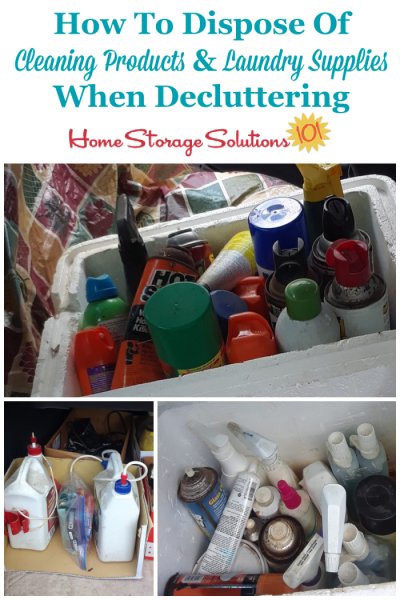
Patti said about her garage clean up, "Pretty close to final phase today as we took all the chemical and other household waste products to the local Eco-Drop recycling facility. The trunk and back seat were loaded!"
Please note that you also need to be careful when disposing of automotive fluids and car maintenance products. Click the link for my article specifically about disposing of these auto supplies.
Safety Precautions When Disposing Of Cleaning Supplies Down The Drain
While it is safe, typically, to put most cleaning supplies down the drain, you will still need to follow safety precautions to make sure that while you're busy decluttering you don't accidentally mix various chemicals together that can cause a bad reaction.
For example, you should never mix any products that contain chlorine bleach with a product that contains ammonia.
Therefore, also make sure to thoroughly flush the drain between disposing of each individual product so during the process of disposal you don't have these chemicals meet inside your drain.
Don't Forget To Recycle Containers After They're Empty
Once the contents of the cleaning products containers are poured out, the packaging of household cleaners can be safely thrown in your recycle bin or trash.
Most plastic cleaning bottles are made of #1 and #2 plastics, which are the most commonly recycled.
Any cardboard packaging that a powder may have come in can be recycled with your paper products.
Most recycling centers and waste management municipalities that provide recycling will also recycle empty aerosol cans.
If the aerosol can isn't empty, contact your local waste management as they may still accept full aerosol cans.
What Are Typical Expiration Dates For Cleaning & Laundry Products?
Most cleaning supplies don't have an expiration date marked on them, but they do have a time after which they're just not as effective.
Here's some general rules about various cleaning and laundry supplies that you might like to know.
Air fresheners. The aersol and other types of these products are most effective in the first two years.
Chlorine Bleach. The effectiveness of bleach degrades relatively quickly. For the first 3 - 5 months you have a new bottle it will be the most potent. For household use it should be good for about 9 months after you bring home a new bottle.
Dish soap. Surprisingly, this is most effective in the first year.
Fabric Softener. Fabric softener is good for about a year, regardless of being a liquid or a dryer sheet.
Laundry Detergent. Powder and liquid formulas maintain their potency for 6 months to a year after they were opened, and about a year to two years unopened. They could still be good after that but may lose some of their effectiveness in getting your clothes clean.
Metal polish. The polishes, such as those meant for brass, silver or copper, typically last about three years.
Multi-Surface Cleaners. Multi-surface cleaners and glass cleaners are good for up to two years, unless antibacterial ingredients are present and then they are good for one year.
Oxygen Bleach Powder. If kept in a cool location and dry, oxygen bleaches, such as Oxiclean have an unlimited shelf life.
Stain Removers. Stain removers are good for a year and then begin to lose their effectiveness.
Wood polish. Wood polish is effective for approximately two years.
If your products don't have the date they were manufactured on them, writing the date on the bottle when you purchase them with a marker may help you keep track of how long you normally keep these items around and will let you know when it is time to buy a new bottle.
If a powder is clumping, throw it out, especially if it is for the laundry as it won't dissolver properly in the water.
Finally, if you smell an off odor or the cleaners have separated, it is also time to throw it out.
Results From This Decluttering Mission
Many readers have already tackled this Declutter 365 mission and Jen sent in these photos showing what she found in her utility room cabinets, and how much less clutter was in them once she was done with this mission.
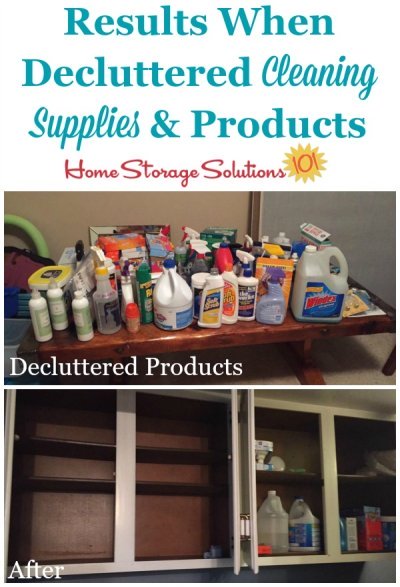
Want To Do More Decluttering Missions? Get Started With Declutter 365 Today!
Once you declutter one type of item in your home I bet you'll want to declutter some more. After all, decluttering gives you a great reward for even a small investment of time and energy.
The Declutter 365 system is designed to help you declutter, over the course of a year, your entire house, with just 15 minutes of decluttering each day!
Hundreds of thousands of people use this proven system to get rid of their clutter, and bring peace and calm back to their homes.
Declutter 365 works to guide you to clear the clutter without overwhelm, focusing on just one small area at a time, and without making a huge mess in the process, so you see consistent forward progress without all that "messy middle" that makes it even harder to function in your home than before you started.
In addition to building a daily decluttering habit, the Declutter 365 program, along with the accompanying 52 Week Organized Home Challenge, teaches you the skills, habits, routines, and mindsets necessary to maintain the clutter free and organized state of your home from now on, so it'll never be as messy and cluttered as it is right now, ever again.
If you haven't already, make sure to get your copy of this year's Declutter 365 annual calendar here (it's FREE!), find today's date, and do 15 minutes of decluttering on the day's mission. Then, repeat again tomorrow, and again and again. Over the course of the next year, if you do this 15 minutes per day, you'll declutter your whole house!

Get This Cleaning Decluttering Checklist + 32 Other Decluttering Checklists For Your Home
Right now you're decluttering items related to cleaning your home, and there's a lot of stuff to declutter in this category.
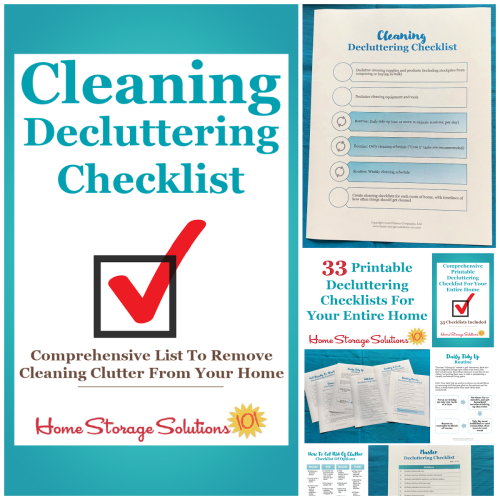
I've done the hard work of breaking down these tasks into smaller more manageable steps for you, so you don't get overwhelmed or worry you're forgetting a task, and you can go at the pace you want, whether that's fast or slow.
In addition, you can tackle these decluttering tasks in whatever order you want when you use these checklists!

Top photo courtesy of Keith Williamson
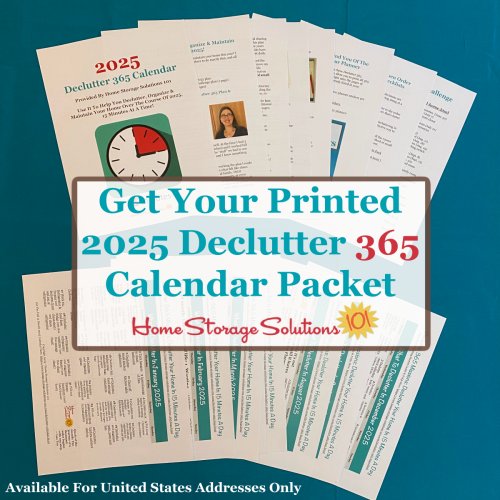
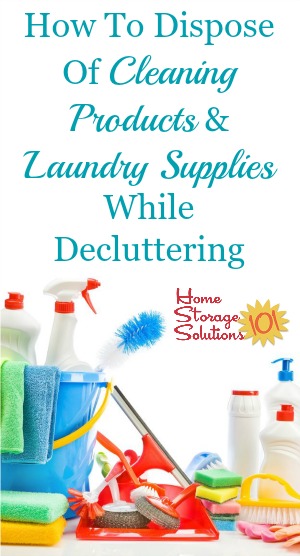

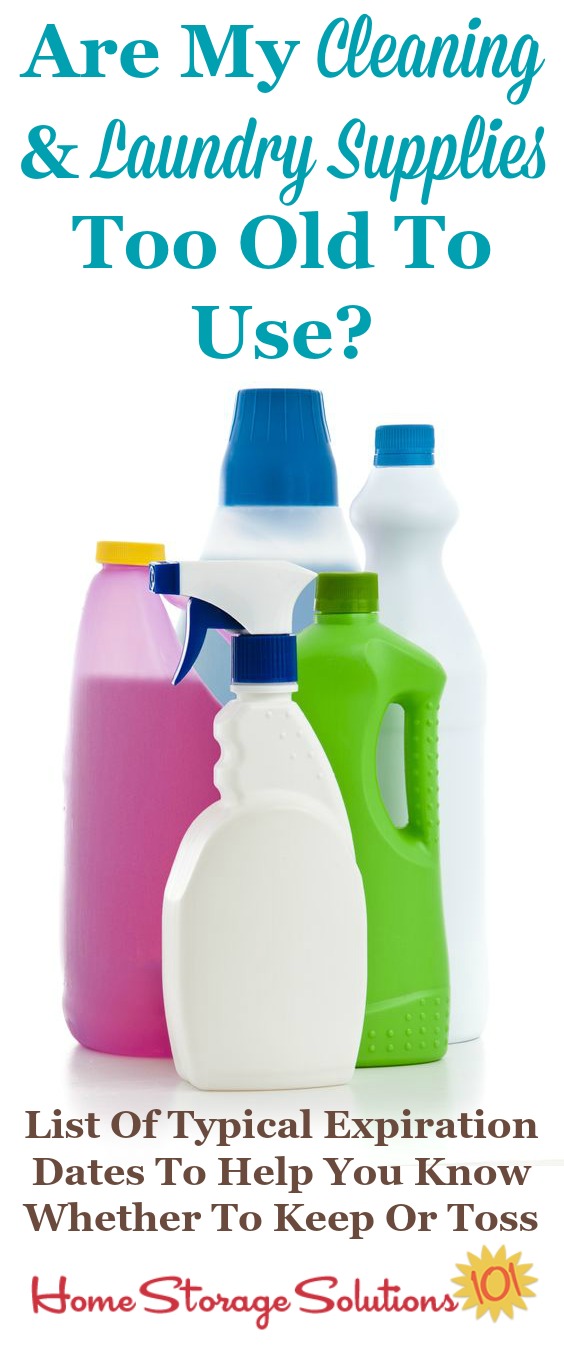
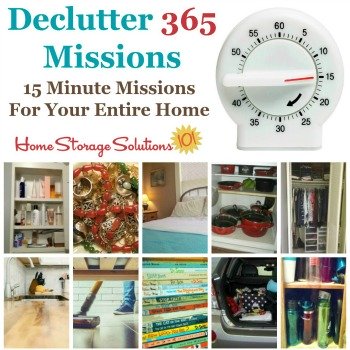
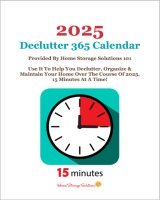
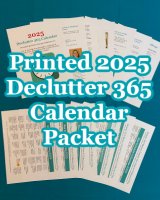
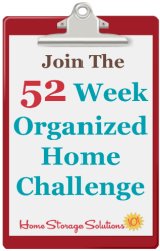



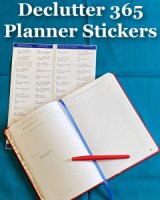

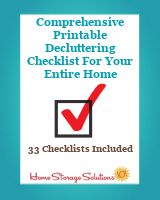


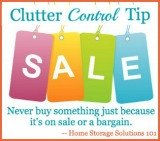
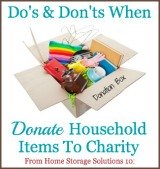
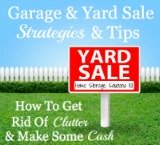
Share Your Comments, Tips & Ideas
I would love to hear from you, sharing your thoughts, questions, or ideas about this topic, so leave me a comment below. I try to always respond back!